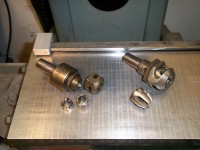Unfortunately Pete, some people will disagree with some of your points raised. Myself being one of them.
Having now nearly 50 years under my belt (I started off very early in life), and have been threading for at least 45 of those, I think I know how things should be done, but I NEVER force my views onto other people, I only suggest that it is my way of doing things and people can read into that however they want to. They can follow my lead or not, I can only make suggestions.
Your comment about only using the best HSS tooling is really annoying to me, purely because, unless I am doing production work, where I will throw away a bulk purchased HSS (but still expensive) tap or die at the first sign of a squeak, I swear by carbon tooling. In fact tooling supplied by Tap & Die which are what they call HQS steel.
I have carbon tooling sets made by Presto going back over 30 years and they still cut as well as the first day that I bought them. I do resharpen them myself by hand BTW.
In my own opinion, correctly made carbon T & D's far outlast HSS ones many times over, and cut a much cleaner thread in most materials, especially stainless, but that is only my opinion, and mine alone.
It is always up to the person doing the job that has to take into account what he has need for.
Not everyone can afford the nearly 1000 pounds that I paid renewing and updating all my carbon T & D's sets a short while ago, some people only have a few bucks they can spare, so they HAVE to go with what they can afford, no matter what information we can impart to them.
All we experienced people can do is suggest, NOT TELL people how they can solve a problem.
No offence suggested.
John






